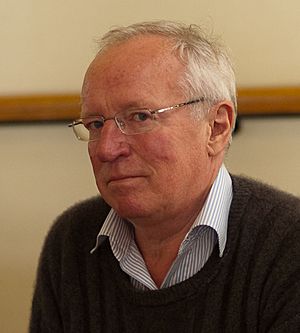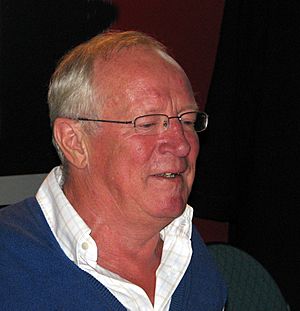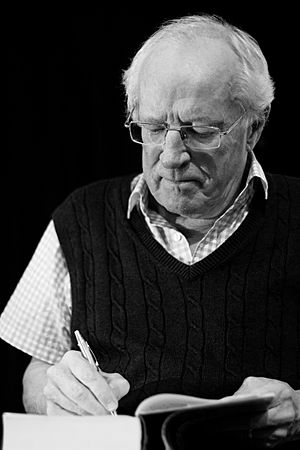Robert Fisk facts for kids
Quick facts for kids
Robert Fisk
|
|
|---|---|

Robert Fisk at Al Jazeera Forum 2010
|
|
| Born | 12 July 1946 Maidstone, Kent, England
|
| Died | 30 October 2020 (aged 74) Dublin, Ireland
|
| Citizenship |
|
| Education |
|
| Occupation | Middle East correspondent for The Independent |
|
Notable credit(s)
|
|
| Spouse(s) |
|
Robert Fisk (12 July 1946 – 30 October 2020) was an English writer and journalist. He was critical of United States foreign policy in the Middle East, and the Israeli government's treatment of Palestinians. His stance earned him praise from many commentators, but was condemned by others.
As an international correspondent, he covered the civil wars in Lebanon, Algeria, and Syria, the Iran–Iraq conflict, the wars in Bosnia and Kosovo, the Soviet invasion of Afghanistan, the Islamic revolution in Iran, Saddam Hussein's invasion of Kuwait, and the U.S. invasion, and occupation of Iraq. An Arabic speaker, he was among the few Western journalists to interview Osama bin Laden, which he did three times between 1993 and 1997.
He began his journalistic career at the Newcastle Chronicle and then the Sunday Express. From there, he went to work for The Times as a correspondent in Northern Ireland, Portugal and the Middle East; in the last role, he based himself in Beirut intermittently from 1976. After 1989, he worked for The Independent. Fisk received many British and international journalism awards, including the Press Awards Foreign Reporter of the Year seven times.
Books by Fisk include The Point of No Return (1975), In Time of War (1985), Pity the Nation: Lebanon at War (1990), The Great War for Civilisation: The Conquest of the Middle East (2005), and Syria: Descent Into the Abyss (2015).
Contents
Early life and education
Fisk was an only child, born in Maidstone, Kent, to William and Peggy Fisk. His father William ('Bill') Fisk (1899–1992) was Borough Treasurer at Maidstone Corporation and had fought in the First World War. His mother, Peggy (Rose) Fisk, was an amateur painter who in later years became a Maidstone magistrate. At the end of the war Bill Fisk was punished for disobeying an order to execute another soldier; his son said, "My father's refusal to kill another man was the only thing he did in his life which I would also have done." Though his father said little about his part in the war, it held a fascination for his son. After his father's death, he discovered that he had been the scribe of his battalion's war diaries from August 1918.
Fisk was educated at Yardley Court, a preparatory school, then at Sutton Valence School and Lancaster University, where he undertook his B.A. in Latin and Linguistics and contributed to the student magazine John O'Gauntlet. He gained a PhD in political science from Trinity College Dublin in 1983; the title of his doctoral thesis was "A Condition of Limited Warfare: Éire's Neutrality and the Relationship between Dublin, Belfast and London, 1939–1945". It was published as In Time of War: Ireland, Ulster and the Price of Neutrality 1939-1945 (London: André Deutsch, 1983; reprinted in Dublin by Gill & MacMillan, 1996). Reviewer F. I. Magee in 1984 stated: "This book presents a detailed and definitive account of Anglo-Irish relations during the Second World War....Fisk's excellent book highlights the ambivalence in relations between Britain, the Irish Republic and Northern Ireland and goes a long way towards explaining why the current situation is so intractable."
Career
Newspaper correspondent
Fisk worked on the Sunday Express diary column before a disagreement with the editor, John Junor, prompted a move to The Times. From 1972 to 1975, at the height of the Troubles, Fisk was The Times' Belfast correspondent, before being posted to Portugal following the Carnation Revolution in 1974. He then was appointed Middle East correspondent (1976–1987). In addition to the Troubles and Portugal, he reported the Iranian revolution in 1979. When a story of his on Iran Air Flight 655 was spiked shortly after the paper's takeover by Rupert Murdoch, Fisk moved to The Independent in 1989. The New York Times described Fisk as "probably the most famous foreign correspondent in Britain". The Economist referred to him as "one of the most influential correspondents in the Middle East since the second world war."
War reporting
Fisk lived in Beirut from 1976, remaining throughout the Lebanese Civil War. He was one of the first Western journalists to report on the Sabra and Shatila massacre in Lebanon, as well as the Hama Massacre in Syria. His book on the Lebanese conflict, Pity the Nation, was published in 1990.
Fisk also reported on the Soviet–Afghan War, the Iran–Iraq War, the Arab–Israeli conflict, the Gulf War, the Kosovo War, the Algerian Civil War, the Bosnian War, the 2001 international intervention in Afghanistan, the invasion of Iraq in 2003, the Arab Spring in 2011 and the ongoing Syrian Civil War. During the Iran–Iraq War, he suffered partial but permanent hearing loss as a result of being close to Iraqi heavy artillery in the Shatt-al-Arab when covering the early stages of the conflict.
After the United States and allies launched their intervention in Afghanistan, Fisk was for a time transferred to Pakistan to cover the conflict. While reporting from there, he was attacked and beaten by a group of Afghan refugees fleeing heavy bombing by the United States Air Force. In his graphic account of his almost being beaten to death until a local Muslim leader intervened, Fisk absolved the attackers of responsibility and pointed out that their "brutality was entirely the product of others, of us—of we who had armed their struggle against the Russians and ignored their pain and laughed at their civil war and then armed and paid them again for the 'War for Civilisation' just a few miles away and then bombed their homes and ripped up their families and called them 'collateral damage'." According to Richard Falk, Fisk said of his attacker: "There is every reason to be angry. I’ve been an outspoken critic of the US actions myself. If I had been them, I would have attacked me."
During the 2003 invasion of Iraq, Fisk was based in Baghdad and filed many eyewitness reports. He criticised other journalists based in Iraq for what he calls their "hotel journalism": reporting from one's hotel room without interviews or first-hand experience of events. Fisk's criticism of the invasion was rejected by some other journalists. Fisk criticised the Coalition's handling of the sectarian violence in post-invasion Iraq and argued that the official narrative of sectarian conflict is not possible: "The real question I ask myself is: who are these people who are trying to provoke the civil war? Now the Americans will say it's Al Qaeda, it's the Sunni insurgents. It is the death squads. Many of the death squads work for the Ministry of Interior. Who runs the Ministry of Interior in Baghdad? Who pays the Ministry of the Interior? Who pays the militiamen who make up the death squads? We do, the occupation authorities. ... We need to look at this story in a different light."
Osama bin Laden
Fisk interviewed Osama bin Laden on three occasions. The interviews appeared in articles published by The Independent on 6 December 1993, 10 July 1996, and 22 March 1997. In Fisk's first interview, "Anti-Soviet warrior puts his army on the road to peace", he wrote of Osama bin Laden, then overseeing the construction of a highway in Sudan: "With his high cheekbones, narrow eyes and long brown robe, Mr. Bin Laden looks every inch the mountain warrior of mujahedin legend. Chadored children danced in front of him, preachers acknowledged his wisdom" while observing that he was accused of "training for further jihad wars".
During one of Fisk's interviews with bin Laden, Fisk noted an attempt by bin Laden to convert him. Bin Laden said: "Mr Robert, one of our brothers had a dream ... that you were a spiritual person ... this means you are a true Muslim". Fisk replied: "Sheikh Osama, I am not a Muslim. ... I am a journalist [whose] task is to tell the truth." Bin Laden replied: "If you tell the truth, that means you are a good Muslim." During the 1996 interview, bin Laden said the Saudi royal family was corrupt. During the final interview in 1997, bin Laden said he sought God's help "to turn America into a shadow of itself".
Fisk strongly condemned the September 11 attacks, describing them as a "hideous crime against humanity". He also denounced the Bush administration's response to the attacks, arguing that "a score of nations" were being identified and positioned as "haters of democracy" or "kernels of evil", and urged a more honest debate on U.S. policy in the Middle East. He argued that such a debate had hitherto been avoided "because, of course, to look too closely at the Middle East would raise disturbing questions about the region, about our Western policies in those tragic lands, and about America's relationship with Israel".
In 2007, Fisk expressed personal doubts about the official historical record of the attacks. In an article for The Independent, he wrote that, while the Bush administration was incapable of successfully carrying out such attacks due to its organisational incompetence, he was "increasingly troubled at the inconsistencies in the official narrative of 9/11" and added that he did not condone the "crazed 'research' of David Icke", but was "talking about scientific issues". Fisk had earlier addressed similar concerns in a speech at Sydney University in 2006. During the speech, Fisk said: "Partly I think because of the culture of secrecy of the White House, never have we had a White House so secret as this one. Partly because of this culture, I think suspicions are growing in the United States, not just among Berkeley guys with flowers in their hair. ... But there are a lot of things we don't know, a lot of things we're not going to be told. ... Perhaps the [fourth] plane was hit by a missile, we still don't know".
Bill Durodié noted that at one point Osama bin Laden had advised the White House to "read Robert Fisk, rather than, as one might have supposed, the Koran."
Syrian Civil War
Reporting from Douma, in April 2018 on the Douma chemical attack, Fisk quoted a Syrian doctor who attributed the victims' breathing problems not to gas but to dust and lack of oxygen after heavy shelling by government forces. Other people he spoke to doubted a gas attack, and Fisk queried the incident. Fisk's reporting drew criticism for having relied on government supplied contacts, with Asser Khattab writing in Raseef22 that the doctor quoted by Fisk "had been introduced to him by officials in the Syrian government and army". Richard Spencer and Catherine Philp in The Times wrote that journalists had been taken to Douma on a government-organised trip while international investigators were forced to remain in Damascus, and that the doctor interviewed by Fisk admitted to not having been to the hospital where the victims were taken. The Snopes website said other reporters on the same trip as Fisk had interviewed locals who said they had inhaled toxic gas.
Fisk returned to the subject of the Douma attacks in early January 2020, in an article concerning internal disagreements within the Organisation for the Prohibition of Chemical Weapons (OPCW) recorded in documents released by WikiLeaks.
Media appearances
He was interviewed by Kirsty Young for Desert Island Discs in 2006. His final selections were Adagio for Strings by Samuel Barber, Le Morte d'Arthur by Thomas Malory, and a violin.
Fisk featured in the 2016 documentary film notes to eternity by New Zealand filmmaker Sarah Cordery, along with Noam Chomsky, Norman Finkelstein and Sara Roy. The film explores their lives and work in relation to the Israel-Palestine conflict.
Fisk was profiled in Yung Chang's 2019 documentary film This Is Not a Movie. In reviewing the film, Slant Magazine stated: "The two things that give this documentary its power and provocativeness are intellectual rather than dramatic: Fisk’s work, and his ideas." Cath Clarke, writing for The Guardian, said the film asks its audience about war: "Is there something deep in our souls that permits it because it feels natural? His painful, deeply serious question about the inevitability of war sets the tone of this documentary about his career, directed by Yung Chang."
Personal life
Fisk married American-born journalist Lara Marlowe in 1994. The couple did not have any children and divorced in 2006. At the time of his death, he was married to Nelofer Pazira, an Afghan-Canadian journalist, author and human rights activist.
On settling down, he wrote in 2005: "I told the journalism students there [at City, University of London] that when I saw families walking happily in London or Paris, I wondered whether I had not missed out on life, that perhaps comparative safety and security with nothing more than the mortgage to worry about was preferable to the existence I had chosen for myself. A friend of my father's once said I had enjoyed the privilege of seeing things that no other man had seen. But after a flood of questions from students in Sydney about suffering in the Middle East, I began to wonder if my privilege had not also been my curse."
Death
On 30 October 2020, Fisk died aged 74 at St Vincent's University Hospital in Dublin, Ireland, after a suspected stroke. Due to the Irish Government COVID-19 restrictions, his funeral was held privately.
The president of Ireland, Michael D. Higgins reacted by saying "with his passing the world of journalism and informed commentary on the Middle East has lost one of its finest commentators" and the Taoiseach Micheál Martin stated that "he was fearless and independent in his reporting, with a deeply researched understanding of the complexities of the Middle East, eastern history and politics".
Memoir
Love in a Time of War, a memoir by Fisk's first wife, Lara Marlowe, was published in 2021. It covers the period from 1988 to 2003, the period Fisk and Marlowe worked together.
Awards, honours and degrees
Fisk received the British Press Awards' International Journalist of the Year seven times, and twice won its "Reporter of the Year" award. He also received Amnesty International UK Media Awards in 1992 for his report "The Other Side of the Hostage Saga", in 1998 for his reports from Algeria and again in 2000 for his articles on the NATO air campaign against the FRY in 1999.
- 1984 Lancaster University honorary degree
- 1991 Jacob's Award for coverage of the Gulf War on RTÉ Radio 1
- 1994 Foreign Reporter of the Year at the British Press Awards for coverage on Algeria, the Hebron massacre, and Bosnia
- 1995 Foreign Reporter of the Year at the British Press Awards
- 1999 Orwell Prize for journalism
- 2001 David Watt Prize for an investigation of the 1915 Armenian genocide by the Ottoman Empire
- 2002 Martha Gellhorn Prize for Journalism
- 2003 Open University honorary doctorate
- 2004 University of St Andrews honorary degree
- 2004 Carleton University honorary degree
- 2005 Adelaide University Edward Said Memorial lecture
- 2006 Ghent University honorary degree Political and Social Sciences
- 2006 American University of Beirut honorary degree
- 2006 Queen's University Belfast honorary degree
- 2006 Lannan Cultural Freedom Prize worth $350,000
- 2008 University of Kent honorary degree
- 2008 Trinity College Dublin honorary doctorate
- 2009 College Historical Society's Gold Medal for Outstanding Contribution to Public Discourse
- 2009 Liverpool Hope University honorary degree
- 2011 International Prize at the Amalfi Coast Media Awards, Italy
Works
Books
His 2005 work, The Great War for Civilisation, was critical of Western and Israeli approaches to the Middle East.
Other books
- The Point of No Return: The Strike Which Broke the British in Ulster (1975). London: Times Books/Deutsch. ISBN: 0-233-96682-X
- In Time of War: Ireland, Ulster and the Price of Neutrality, 1939–1945 (2001). London: Gill & Macmillan. ISBN: 0-7171-2411-8 (1st ed. 1983).
- Pity the Nation: Lebanon at War (3rd ed. 2001). London: Oxford University Press; xxi, 727 pages. ISBN: 0-19-280130-9 (1st ed. was 1990).
- The Great War for Civilisation: The Conquest of the Middle East (October 2005) London. Fourth Estate; xxvi, 1366 pages. ISBN: 1-84115-007-X
- The Age of the Warrior: Selected Writings (2008) London, Fourth Estate ISBN: 978-0-00-727073-6
- Robert Fisk on Algeria: Why Algeria's Tragedy Matters (2013) Independent Print Limited ISBN: 9781633533677
Video documentary
Fisk produced a three-part series titled From Beirut To Bosnia in 1993 which Fisk said was an attempt "to find out why an increasing number of Muslims had come to hate the West". Fisk said that the Discovery Channel did not show a repeat of the films, after initially showing them in full, due to a letter campaign launched by pro-Israel groups such as CAMERA.
See also
 In Spanish: Robert Fisk para niños
In Spanish: Robert Fisk para niños



